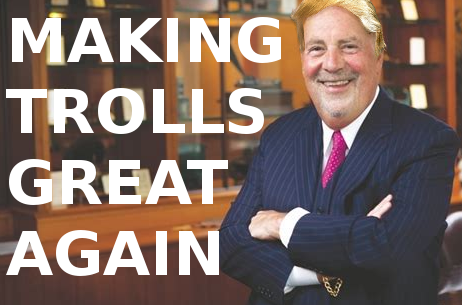

Reference: Death of the father of patent trolling, Ray Niro
AT THE TURN/START of the year we said we would focus on the European Patent Office (EPO), even at the expense of USPTO and American patent cases (especially the latter). But every now and then we see something important enough in the US and it is worth noting.
"The talk about Congressional intervention isn't particularly new. Coons, for example, has been trying and failing for years. He's trying again."35 U.S.C. ۤ 101 is not going away. USPTO management may try to ignore it, but SCOTUS isn't doing anything to change it. Earlier this week we saw additional appeals from Watchtroll to compel SCOTUS to revisit the matter, but it's just not happening. In the meantime or meanwhile the Federal Circuit rejects Iancu's notorious guidance and inter partes reviews (IPRs), not ex, carry on as usual.
Yesterday we noticed that Steve Brachmann from Watchtroll demonises the Patent Trial and Appeal Board (PTAB) by going after “big tech” (the site hates technology, but it loves lawsuits over technology). It's the second time this week; he's just following up his boss. Months ago he attacked Zoe Lofgren for her pro-science/technology stance. This is how desperate these people have become. They attack judges, they attack politicians who aren't in the pockets of law firms, and somehow they expect to be taken seriously? We've also just noticed some of them citing Koch-funded 'research' on patents. They try anything they can to weaken €§ 101, but it's not getting anywhere. In fact, they're losing even more.
We're already seeing these patent maximalists irked by the fact that the Federal Circuit now (belatedly) views GUI patents as abstract and thus bogus, fake, invalid -- a reversal of this court's position from about a year ago (we wrote quite a lot about it back then). We've included links about that in our daily links (Patently-O, Watchtroll and others). The gist of it is that courts only get tougher, not more lenient, and technology companies step in to defend the courts/caselaw. Based on this tweet, the majority of patent lawsuits still get filed by patent trolls, so any pretense that innovation is at stake should be laughed off. The patent maximalists told us that their 'religion' would encourage innovation, but these days -- even after reforms -- these systems mostly embolden those whose career involves blackmail and extortion with software patents.
The talk about Congressional intervention isn't particularly new. Coons, for example, has been trying and failing for years. He's trying again. This time too he will fail. It already loses momentum because nobody talks about it this week, except the EFF's Alex Moss, who has just published "The Tillis-Coons patent bill will be a disaster for innovation" (we've mentioned it several times recently).
To quote:
In recent years, we’ve made major progress getting courts to give full effect to Section 101 of the U.S. Patent Act. That’s the section that defines, and limits, what can get a patent. Section 101 is critical in making sure that only inventions—technological advances attributable to human efforts—can be patented.
Now, key Senators are looking to undo all of that progress and drive the patent system into uncharted territory. Senators Tillis (R-NC) and Coons (D-DE) are pushing ahead with a proposal that will upend more than a century of case law and make the patent system far worse for small innovators and ordinary consumers in the software and health care industries.
Who will benefit most from the proposal? Companies that make money from aggressively licensing and litigating patents, especially in the fast-growing fields of artificial intelligence and medical diagnostics. And, of course, the patent lawyers and law firms who make money representing them.
Not to mention, patent trolls. With Section 101 broken, defendants will have lost a powerful tool for fighting bad patents. Most of the small businesses we profiled in our “Saved by Alice” project would have likely been pushed toward lengthy and expensive trials, rather than fast and fair resolutions, in order to defend against false infringement charges.